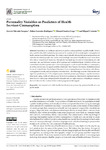Personality Variables as Predictors of Health Services Consumption

Use este enlace para citar
http://hdl.handle.net/2183/28138
A non ser que se indique outra cousa, a licenza do ítem descríbese como Attribucion 4.0 Internacional
Coleccións
- Investigación (FDER) [672]
Metadatos
Mostrar o rexistro completo do ítemTítulo
Personality Variables as Predictors of Health Services ConsumptionData
2021-05-13Cita bibliográfica
Taboada-Vázquez, A.; Gonzalez-Rodriguez, R.; Gandoy-Crego, M.; Clemente, M. Personality Variables as Predictors of Health Services Consumption. Int. J. Environ. Res. Public Health 2021, 18,5161. https://doi.org/10.3390/ijerph18105161
Resumo
[Abstract]: Expenditure on healthcare and services can be a serious problem for public health. Personality
variables should be included as indicators to be considered when studying the consumption of
health resources and their planning. This study aims to identify the psychological and psychosocial
variables that identify people who can be considered high consumers of health resources versus those
who barely consume such resources. The sample was made up of a total of 1124 subjects; one half
were men, and one half were women, all of legal age and residents in Spain. A battery of tests was
created that included a questionnaire of sociodemographic variables and of healthcare consumption,
as well as several psychological variables (Zimbardo Time Paradox Inventory, Multidimensional
Locus of Control Scale, Psychological Reactance Scale, Coping Responses Inventory, self-efficacy
scale applied to health, and the Symptom Checklist-90-R). The following variables of the model were
significant predictors (p _ 0.05): a negative past, a fatalistic present, psychological cognitive reactance,
behavioral coping, health self-efficacy, and the level of somatization. Data from the statistical analyses
show how to create a psychological profile of people who are high consumers of healthcare resources
that will allow for the creation of intervention programs in this regard.
Palabras chave
Environment and public health
Health services
Personality
Personal health services
Public health
Medio ambiente y salud pública
Servicios de salud
Personalidad
Servicios de salud personal
Salud pública
Medio ambiente e saúde pública
Servizos de saúde
Personalidade
Servizos de saúde persoal
Saúde pública
Health services
Personality
Personal health services
Public health
Medio ambiente y salud pública
Servicios de salud
Personalidad
Servicios de salud personal
Salud pública
Medio ambiente e saúde pública
Servizos de saúde
Personalidade
Servizos de saúde persoal
Saúde pública
Versión do editor
Dereitos
Attribucion 4.0 Internacional
ISSN
1661-7827
Ítems relacionados
Mostrando ítems relacionados por Título, autor ou materia.
-
How a bottom-up multi-stakeholder initiative helped transform the renal replacement therapy landscape in Spain
Selgas, Rafael; Rodríguez, Laura; Julián Mauro, Juan Carlos; Remón, César; Prieto-Velasco, Mario; Pérez-Contreras, Javier; Pérez-Fontán, Miguel (Springer, 2017-03-06)[Abstract] Healthcare reforms aim to change certain parts of the health system to improve quality of care, access, or financial sustainability. Traditionally, healthcare reform is understood as an action undertaken by a ... -
Percepción de la salud : determinantes sociales en la atención primaria
Souto-Camba, Sonia (2012)[Resumen]La percepción de salud (PS) es un indicador subjetivo del estado de salud, usado en las encuestas de salud en Atención Primaria. OBJETIVO: Explorar la PS de los habitantes de un barrio con contrastes socioeconómicos, ... -
Should inflammatory bowel disease clinicians provide their patients with e-Health resources?: patients' and professionals' perspectives
Echarri, Ana; Pérez-Calle, José Luis; Calvo, Marta; Molina, Gema; Sierra Ausín, Mónica; Morete-Pérez, María C.; Manceñido, Noemí; Botella, Belén; Cano, Noelia; Castro, Beatriz; Martín-Rodríguez, Daniel; Sánchez-Ortega, Yolanda; Corsino, Pilar; Cañas, Mercedes; López-Calleja, Ana M.; Nos, Pilar; Muñiz, Javier (Mary Ann Liebert, 2022-12-22)[Abstract] Introduction: The internet is emerging as a source of information for patients with inflammatory bowel disease (IBD). However, it is not always reliable and may cause anxiety. We aim to assess patients' information ...






